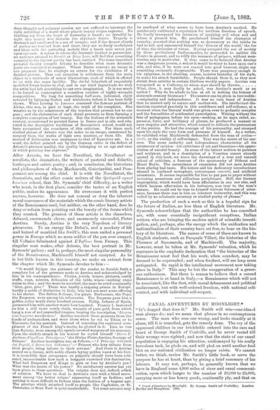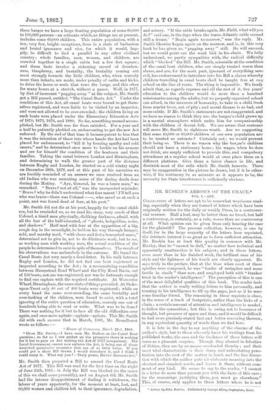CANAL ADVENTITRES BY MOONLIGHT.* "Ir's dogged that does it." Mr.
Smith will win—one-idea-d men always do ; and we mean that phrase in no contemptuous sense. The man who sees one wrong, and looks steadily at it alone, till it is remedied, gets the remedy done. The cry of the oppressed children in our brickfields entered into the ears and heart of George Smith of Coalville, and he never rested till their wrongs were righted ; and now that the state of our canal population is engaging his attention, undismayed by his really herculean task, he plods on, and will plod on until another foul blot on our national civilisation no longer exists. We cannot better, we think, review Mr. Smith's little book, or serve the purpose he has at heart, than by giving a brief summary of his labours. It may not, perhaps, be generally known that we have in England some 4,800 miles of river and canal communi- cation, upon which barges to the number of 20,000 to 25,000, carrying more or less heavy goods, continually ply, and that on
• Canal Adventures by Moonlight. By George Smith (of Coalville). London Hodder and Stoughton. 1881.
these barges we have a large floating population of some 80,000 to 100,000 persons—an estimate which, as things are at present, includes some 60,000 children. This entire population, with a few, very few, bright exceptions, lives in a state of barbarism and brutal ignorance and vice, for which it would, hap- pily, be difficult to find a parallel in any other civilised country ; whole families, men, women, and children, are crowded together in a single cabin but a few feet square ; and these facts involve a sickening record of drunken- ness, blasphemy, and brutality, the brutality coming out most strongly towards the little children, who, when scarcely more than infants, are made, under penalty of oaths and kicks, to drive the horse or mule that tows the barge, and this often for many hours at a stretch, without a pause. Well, in 1877, by dint of incessant "pegging away " at the subject, Mr. Smith got a Bill passed, entitled, " The Canal Boats Act." Under the conditions of this Act, all canal boats were bound to get them- selves registered, and were liable to be visited by an inspector, and were not allowed to be over-crowded; the children living on such boats were placed under the Elementary Education Acts of 1870, 1873, 1876, and 1880. So far, something seemed accom- plished, but Mr. Smith was far from satisfied. For a year and a half he patiently plodded on, endeavouring to get the new Act enforced. By the end of that time it became patent to him that it was the intention of those into whose hands the Act had been placed for enforcement, to "kill it by freezing apathy and cold sneers," and he determined once more to buckle on his armour and see for himself the condition of the boatmen and their families. Taking the canal between London and Birmingham, and determining to walk the greater part of the distance between Rugby and London, he started on a cold wintry night on December 28th, 11378, and at this part of his narrative we are forcibly reminded of an answer we once received from an old Indian who was narrating some of the daring deeds done during the Mutiny. "Aye, General, he was a brave man," we remarked. " Brave ? not at all," was the unexpected rejoinder.
" Brave ? why he didn't understand what fear meant ! tell you who was brave—there was Colonel —, who saved us at such a point, and was found dead of fear, at his post."
Mr. Smith did not die at his post, happily for the canal child- ren, but he reminded us, as we read his story, very much of that Colonel, a timid man physically, disliking darkness, afraid, with all the fear of the half-educated, of "ghosts, hobgoblins, noise, and shadows." Half mad with fear at the apparition of a big, rough dog in the moonlight, he held on his way through hunger, cold, and marshy mud, " with shoes and feet a benumbed mass," determined not to give in, not to do dilettante work, but to see, as working man with working men, the actual condition of the people he determined to save in spite of themselves. The result of his observations was melancholy in the extreme. He found the Canal Boats Act very nearly a dead-letter. In his walk between Rugby and London, he did not find one boat registered or inspected according to the Act ; in a reconnoitring expedition between Hampstead Road Wharf and the City Road Basin, out of 150 boats, not one was registered, nor was he fortunate enough to find one captain with the required certificate. At Worcester Wharf, Birmingham, the same state of things prevailed. At Stoke- upon-Trent only 40 out of 400 boats were registered ; while on every hand the same over-crowding, the same brutality and over-tasking of the children, were found to exist, with a total ignoring of the entire question of education, scarcely one out of hundreds being able to read or write. What was to be done P There was nothing for it but to face all the old difficulties over again, and once more agitate—agitate--agitate. This Mr. Smith did with such success that in March, 1881, Mr. Broadhurst wrote as follows :—
" House of Commons, March 21st, 1881.
"DEAR MR. SM1TH,—I have seen Mr. Dodson on the Canal Boat question ; so far as I can gather up the prospects there is nothing for it but to pass an Act making the Act Of 1877 compulsory. The Local Government cannot now enforce the Act, it being one of those wretched permissive measures that are of so little value. If you could get a short Bill drawn I would introduce it, and I think I could carry it. What say you P—Truly yours, HENRY BROADHURST."
Mr. Smith then prepared a Bill to amend the Canal Boats Act of 1877. This Bill was read for the first time on the night of June 24th, 1881; in July the Bill was blocked (to the cause of this we shall come presently), and on August 6th Mr. Smith had the intense disappointment of finding it withdrawn, the labour of years apparently, for the moment at least, lost, and 60,000 women and children left to their ignorance, degradation,
and misery. "If the cable breaks again, Mr. Field, what will you do P" said one, in the days when the trans-Atlantic cable seemed still a dream.' " Begin again to-morrow," was the reply. Mr. Smith likewise began again on the morrow, and is, in this very book he has given us, "pegging away" still. He will succeed, but we would point out the weak link in his chain. We fully understand, we partly sympathise with, the radical difficulty which " blocked " the Bill. Mr. Smith, miserable at the condition of the canal boat children, who are simply treated worse than slaves, and are, for the most part, ignorant of everything save evil, has endeavoured to introduce into his Bill a clause whereby children travelling in canal boats shall be taught free at atty school on the line of route. The thing is impossible. We freely admit that, as regards expense and all the rest of it, five years' education to the children would do more than a hundred missionaries among the adults, but no properly organised school can afford, in the interests of humanity, to take iu a child fresh from scarlet fever, out of pity ; and moral disease is as bad, and more subtle. If Mr. Smith's statements are not exaggerated, and we have no reason to think they are, the bargee's child grows up- in a mental atmosphere which unfits him for companionship with the children of decent folk. We are aware that sentence will move Mr. Smith to righteous wrath. Are we suggesting that some 40,000 or 60,000 children of our own population are to be treated as outcasts ? Certainly not; we would prevent their being so. There is no reason why the bargee's children should not have a stationary home ; his wages, when he does not drink, are amply sufficient to provide this, and compulsory attendance at a regular school would at once place them on a different platform. Give them a fairer chance in life, and diminish most of the evils which Mr. Smith laments. There may be exaggeration in the picture he draws, but if it be other- wise, if his testimony be as accurate as it appears to be, the necessity for State interference is sufficiently obvious.















































 Previous page
Previous page